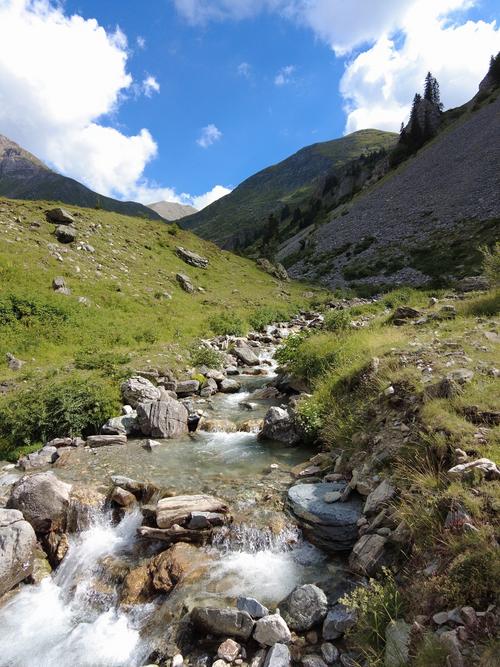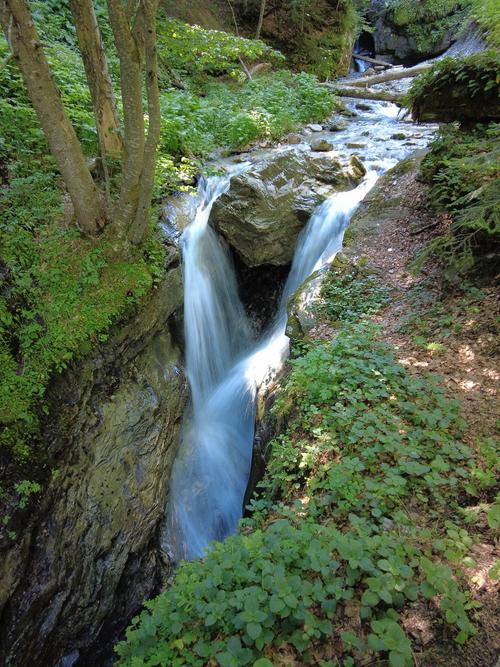++ A milestone that puts wind into the sails of NGOs’ fight for free-flowing rivers ++ A vital first step to continue the protection of rivers in all of North Macedonia’s national parks ++

The Shar Mountains in the border triangle between North Macedonia, Albania and Kosovo belong to the most primeval mountain landscapes in Europe. Rivers can still flow freely here.
© Eko-svest
This waterfall in the Shar Mountains remains unobstructed. However, it is still uncertain whether this will also apply to the rivers in other protected areas in the country.
© Eko-svestSkopje. Last week, the Government of the Republic of North Macedonia made an extraordinary decision to revoke seven concessions for small hydropower plants in the newly proclaimed Shar Planina National Park. This decision will protect the integrity of the national park and preserve crucial habitats for wildlife and river continuity on Shar Mountain. Moreover, this monumental action strongly encourages NGOs' fight for free-flowing rivers and serves as a stepping stone to cancelling concessions for all small hydropower plants in Mavrovo National Park and other protected areas.
“We applaud the decision made for the preservation of the rivers in Shar Planina National Park, and we encourage the Ministry of Environment and Spatial Planning to also revoke the concessions for the small hydropower plants in Mavrovo National Park,” says Ana Colovic Lesoska, Executive Director of the North Macedonian NGO Eko-svest. “For over ten years, unsustainable management of the national park has caused tremendous damage to the delicate ecosystems the park hosts. By prioritising protective measures and halting hydropower plans, we can further stimulate the process of the re-proclamation of our oldest national park.“
Currently, Mavrovo National Park is plagued by four built small hydropower plants (sHPPs), three that are permitted and ten more in the planning process. These small hydropower plants yield negligible amounts of electricity while putting tremendous pressure on wildlife and ecosystems, as well as access to clean water for the local communities. Moreover, the infrastructure that is associated with dams, especially the building of roads, makes poaching and illegal logging more likely and threatens the safety of one of the last remaining populations of the endangered Balkan Lynx. And despite a decade of protests and advocacy work by national and international organisations like Front 21/42, Eko-svest, EuroNatur and Riverwatch, state authorities have not yet implemented the crucial measures to cancel and prevent hydropower concessions within the park.
“We are happy about the Government’s Decision for cancellation of 7 small HPPs within the newly proclaimed NP Shar Planina, as well as the ban on new hydropower plants in every zone of the park, according to the Draft Management Plan. Having said that, this doesn’t mean that the new National Park is HPPs free, there are few remaining. Having in mind that the Management Plan is still not adopted, it is not too late for cancellation of all hydropower plants”, says Anja Jovanova, environmental lawyer at Front 21/42.
“This decision reflects an inspiring, growing trend across the Balkans. Some national governments are taking a stand against destructive and unnecessary small hydropower, as the recently decided licensing stop for new projects in Montenegro and in the Federation of Bosnia and Herzegovina shows. We appeal to governments in other Balkan states to also stop the expansion of small hydropower plants, in particular, to prevent the destruction of pristine rivers and protected areas”, says Dr Amelie Huber from EuroNatur.
Background information:
- Unspoiled, free-flowing rivers are one of the most critical elements for thriving ecosystems and communities. Healthy rivers are a source of clean drinking water, they nourish deltas and coasts, are home to an incredible array of wildlife, and improve people’s quality of life. Now, governments across the Balkans are starting to recognise this and are taking action to save these blue gems.
- The "Save the Blue Heart of Europe" campaign aims to protect rivers of high natural value in the Balkans that are threatened by 3,400 planned hydropower projects. The campaign is coordinated by the international NGOs Riverwatch and EuroNatur and is implemented jointly with partner organisations in the Balkan countries. The local partners in North Macedonia are Eko-svest and Front 21/42. For more information https://balkanrivers.net/
- The “Save the Blue Heart of Europe” campaign is supported amongst others by the Manfred-Hermsen-Stiftung.
Media contacts:
Gjorgji Mitrevski, Eko-svest | gjorgji(at)ekosvet.com.mk | +389 71 232 103
Anja Jovanova, Front 21/42 | anja.jovanova(at)front.org.mk | +389 78413667
Christian Stielow, EuroNatur | christian.stielow(at)euronatur.org | +49 7732 927215
Cornelia Wieser, Riverwatch | cornelia.wieser(at)riverwatch.eu | +43 650 4544784


